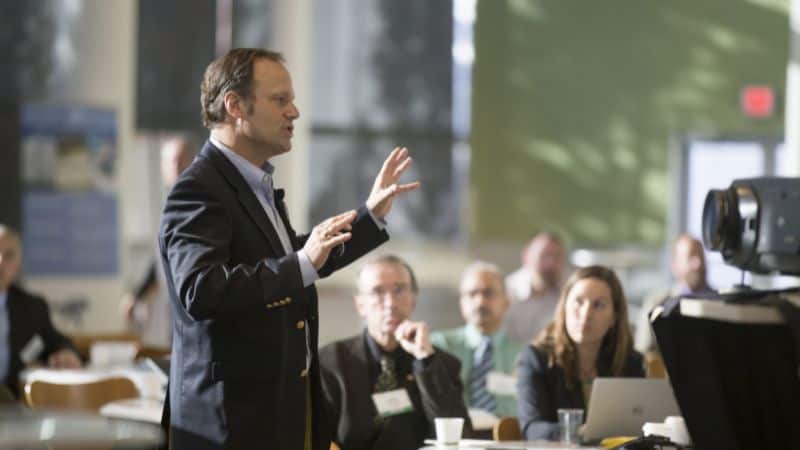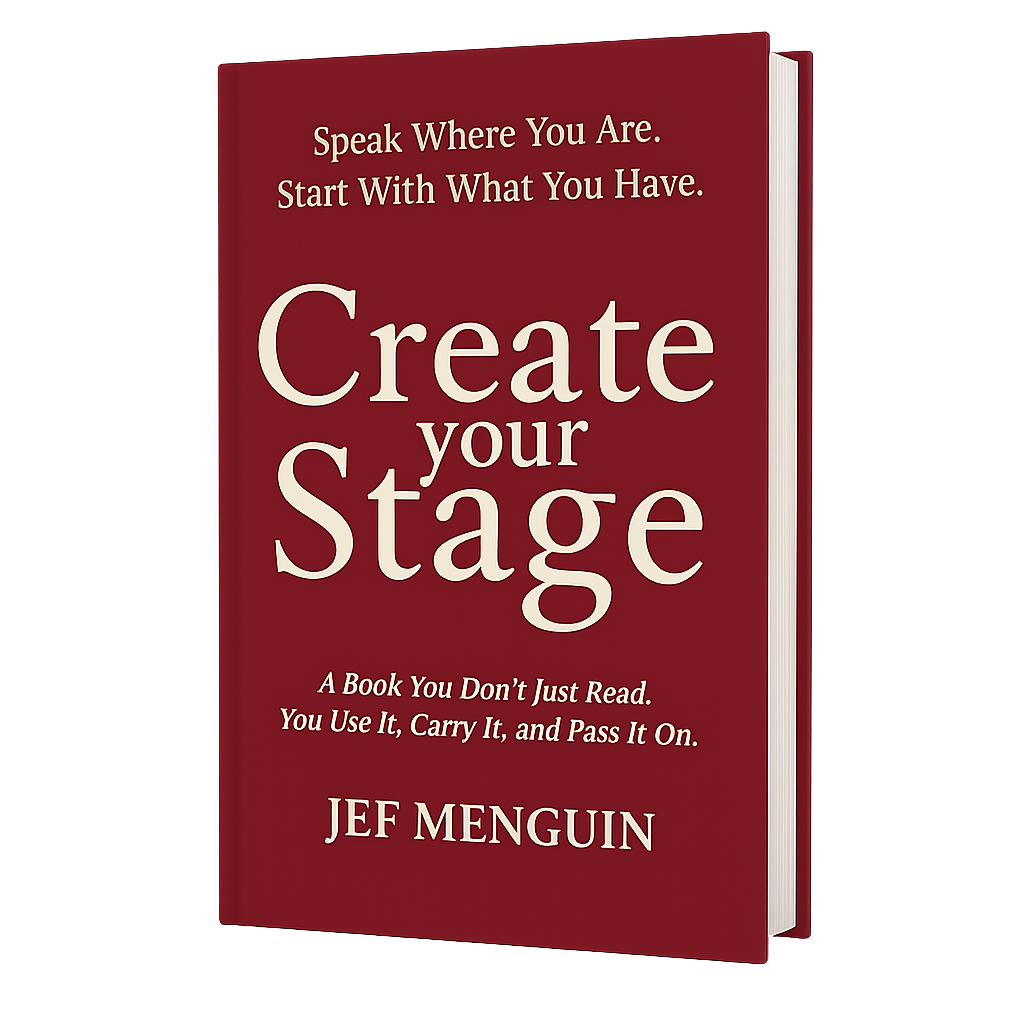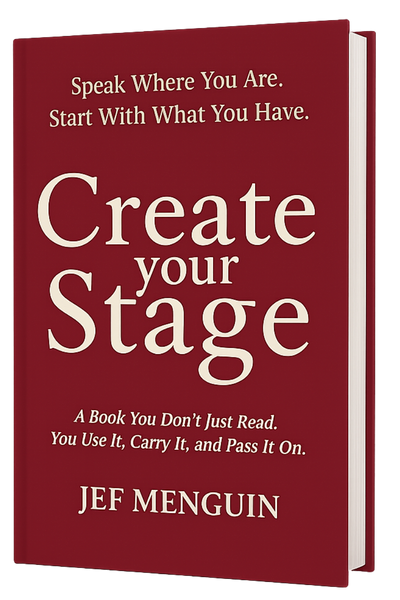There’s a habit that separates those who grow steadily from those who stay stuck. It’s not raw talent. It’s not waiting for opportunities. It’s not even practice—at least, not the way most people understand practice.
The secret is this: rehearse before you speak.
Not once. Not twice. Not only when you’ve been invited. Every day.
You rehearse not because there’s a speech tomorrow. You rehearse because you are the kind of person who always prepares for what might come.
That’s what I’ve done for years. Even when no one asked me to speak, I would find a quiet corner, pull out a scrap of paper, and run through my speech as if tomorrow was the biggest stage of my life.
Why? Because every action is a rehearsal for the next. And if you treat life that way, you grow faster than you ever expect.
Practice vs. Rehearsal
At first glance, practice and rehearsal look the same. Both involve repetition. Both involve doing something again and again.
But here’s the critical difference:
- Practice makes you better at whatever you repeat. Right or wrong. Helpful or harmful.
- Rehearsal makes you better at what you intend to perform. It is not repetition for its own sake—it is preparation for the moment you will be seen, heard, and measured.
That difference is everything.
Mediocre salespeople practice the wrong method until it becomes their second nature. Mediocre teachers practice the wrong way of teaching until their classrooms become graveyards of curiosity. Mediocre managers practice poor leadership until their teams shrink in silence. And yes—mediocre speakers practice bad habits until the audience learns only one thing: boredom.
That’s the danger of practice without rehearsal. You get good at the wrong thing.
Why Training Isn’t Enough
I’ve seen it in organizations. They spend millions on training programs. Competent instructors. Well-crafted materials. A neat buffet after every seminar.
And yet… people go back to work unchanged.
Why? Because they never rehearsed.
Most of us never get the opportunity to apply what we’ve been taught. We sit through lectures, nod at frameworks, even pass a test at the end. But without rehearsal—without trying, fumbling, adjusting, and trying again—we fall back to the old ways.
Learning without rehearsal is like watching YouTube tutorials without ever touching the guitar.
You know the chords. You can quote the teacher. But you can’t play the song.
Rehearsal as Identity
Don’t rehearse for the speech. Rehearse as a speaker.
That’s how mastery begins.
When I was young in my career, I didn’t always have speaking opportunities. There were weeks, even months, when no one invited me to the stage. But I rehearsed anyway. I would pace around my room, deliver my opening line out loud, refine a story until it carried more weight, and experiment with gestures I had never tried before.
At first it felt foolish. Who rehearses a speech no one asked for?
But over time, I realized: I wasn’t rehearsing for them. I was rehearsing for me.
Rehearsal wasn’t about perfection. It was about identity.
Every time I rehearsed, I became more of a speaker.
Not when the event came. Not when the invitation landed. But daily, in private, when no one clapped.
That’s why rehearsal is not just about growth. It’s about becoming.
Every Action as Rehearsal
Think about it this way:
- Every conversation is a rehearsal for the next bigger conversation.
- Every meeting is a rehearsal for the next bigger stage.
- Every small story you tell at dinner is a rehearsal for the keynote story you will one day tell in front of thousands.
When you take life as a sequence of rehearsals, you grow without waiting for permission.
Instead of saying, “I’ll prepare when I have a talk,” you live as if every moment is preparation.
This is why the best leaders, teachers, and speakers don’t suddenly shine when opportunity comes. They shine because they’ve been rehearsing—long before anyone was watching.
How to Rehearse Daily (Even Without a Stage)
- Rehearse Out Loud
Silent practice doesn’t count. Speaking is physical. Your voice, pacing, breath, and gesture matter. Say it aloud, even if it’s just to your bathroom mirror. - Rehearse in Scenes
Don’t run the whole talk every time. Pick one story, one opening, one transition. Rehearse that. Sharpen it. Then move to another. - Rehearse the Mistakes
Don’t just polish the perfect flow. Rehearse what you’ll do when the mic fails, when you forget a line, when the audience looks bored. The more you rehearse the “worst,” the more confident you’ll feel in the moment. - Rehearse with Reflection
After every attempt, pause. Ask yourself:
- What worked?
- What surprised me?
- What will I repeat?
- What will I change?
This is where rehearsal beats practice. It’s not mindless repetition—it’s mindful reflection.
Stories of Rehearsal That Changed Everything
A young teacher once told me she rehearsed every lecture three times before class. Once in the morning, once after lunch, once at night. Her colleagues laughed. “Why waste the energy? You’ll only repeat it tomorrow.”
But when she entered the classroom, her students came alive. They felt her confidence. They responded to her clarity. They saw someone who believed in them enough to prepare—not just for content, but for connection.
Years later, those students still remembered her lessons. Not because the subject was easy. But because she rehearsed for them—even before they arrived.
The Salesman Who Rehearsed Rejections
One salesman I met had a reputation for closing tough deals. When I asked him how he did it, he said:
“I rehearse my rejections.”
Every night, he would imagine ten ways a client might say no—and rehearse ten different responses. By the time he walked into the meeting, no objection surprised him.
Others practiced their pitch. He rehearsed the pushback. And that made all the difference.
My Own Habit of Rehearsing Without Invitation
There was a season when invitations stopped coming. No workshops. No keynotes. No client calls.
But instead of waiting, I rehearsed. Every day, I delivered a story. Sometimes to my son, sometimes to the trees in our yard, sometimes to a blank wall.
When the next opportunity finally came, people said, “You speak as if you’ve been on stage every day.”
And I smiled. Because in truth—I had.
Why Rehearsal Builds Confidence
Confidence is not the absence of fear. It is the memory of rehearsal.
When you step on stage, your heart will race. Your palms will sweat. That’s normal. But when you’ve rehearsed—really rehearsed—you know you’ve been here before. You’ve faced this line. You’ve stood in this silence. You’ve felt this pause.
Rehearsal tells your body: “You’ve done this. You can do this again.”
That’s why the most confident speakers aren’t fearless. They’re prepared.
The Thousandfold Way of Rehearsal
In The Thousandfold Way, I wrote that the deepest changes don’t come from explosions. They come from shifts so small no one notices—except you.
Rehearsal is one of those shifts. It’s not glamorous. No one claps. No one pays. But it multiplies. Quietly. Steadily. Thousandfold.
Because the truth is, rehearsal is not about preparing for one speech. It’s about preparing for a life where every moment is your stage.
The Invitation
Don’t wait for the invitation. Don’t wait for the audience. Don’t wait for the perfect opportunity.
Rehearse today. Rehearse tomorrow. Rehearse until rehearsal is not what you do, but who you are.
Because the person who rehearses daily will never be caught unready. And one day, when the stage lights finally find you, you will not say, “I wish I had prepared.” You will say, “I’ve been rehearsing for this moment all my life.”






